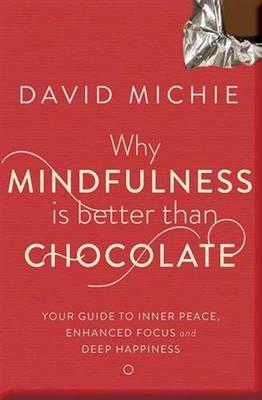Is mindfulness better than chocolate?

Is mindfulness really better than chocolate? Come to think of it, is anything better than chocolate?!
 As it happens, this idea is based on a fascinating recent study by Harvard University which revealed three important facts. First, we are not thinking about what we are doing 47 per cent of the time. Second, we are unhappier when our minds are wandering than when they are not. And third, what we are thinking is a better predictor of our happiness than what we are doing.
As it happens, this idea is based on a fascinating recent study by Harvard University which revealed three important facts. First, we are not thinking about what we are doing 47 per cent of the time. Second, we are unhappier when our minds are wandering than when they are not. And third, what we are thinking is a better predictor of our happiness than what we are doing.
“Paying attention to the present moment, deliberately and non-judgementally”, the definition of mindfulness, holds the key to happiness. The Harvard study showed that “the nature of people’s activities had only a modest impact on whether their minds wandered”. It would seem that whether we’re washing the dishes or eating the most mouth-wateringly delicious Belgian praline, we’re just as likely to have a wandering mind. Eating chocolate is no guarantee that we’re thinking about what we’re doing.
But I have been a little mischievous in creating a false dichotomy between mindfulness and chocolate. There’s no reason to choose between the two. On the contrary, few things can beat chocolate – providing it is eaten mindfully!
Beyond ‘Mindfulness Lite’
Both mindfulness and meditation have become very fashionable of late. And there’s been a flurry of books published on the subject. Does the world need yet another one?
Some months ago I was delivering a mindfulness seminar at UWA AIM Executive Education when I was asked by someone who had just come back from Thailand: “Why do Buddhist monks meditate? After all, they don’t have any stress. All they seem to do is hang around for the next meal to be donated”.
On the surface of things, this may seem a reasonable question. But for me it summed up the tragically diminished idea many people have of what mindfulness and meditation are all about. Yes, they’re great for managing stress, but that isn’t the main reason for practising them. They may be what start us on our journey – it certainly was for me. But the real treasure of mindfulness is that it provides us with the tools to observe the true nature of our own minds.
Starting where you are
Of course, it’s important to meet people wherever they are. And the growing volume of scientific studies show how we can all benefit from mindfulness in basic but profound ways. Stress management? Certainly. Boosting our immune systems and pushing back our biological clocks? That too! The physical and psychological benefits of mindfulness alone are well worth getting out of bed ten minutes earlier for every morning.
Beyond this, mindfulness offers the possibility to change the content of our ongoing conversation with ourselves. Chatter, chatter, chatter. We’re all up to it. But are there recurring themes in this constant stream of self-talk that don’t serve you well? For example, are you a worrier, constantly anticipating all the things that could possibly go wrong then convincing yourself that the worst outcome is almost certain? Are you a victim, or someone who feels blighted by an event in the past? The combination of mindfulness with cognitive behaviour training is one of the most powerful transformation modalities. Creating space amid all the mental agitation, discovering that we can become the observers of our thoughts rather than their unwitting slaves—this is another extraordinary consequence of mindfulness practice.
What is mind?
But most of all, mindfulness enables us to experience our own minds for ourselves, not as a concept or intellectual idea, but directly and first hand. It empowers us to experience the nature of our own consciousness, and many people find, in those first glimpses of the pure nature of our own mind, an extraordinary truth. We discover for ourselves that our mind is, quite literally, infinite. It has no beginning and no end. Far from being some existential void, it is imbued with the most profound happiness-giving qualities.
We experience the paradox that even though we set out to explore our mind, the result is as much a feeling as it is a perception. An experience beyond concept and for which words are therefore wholly inadequate, but that may be hinted at using such terms as ‘oceanic tranquillity’ and ‘radiant love’.
This isn’t some religious experience or ecstatic emotional high. It’s described by meditators from all backgrounds, secular and religious.
Even the briefest experience of it is life-changing, because when we can free ourselves from the agitation or dullness that pervades our minds and encounter our own true nature, if only momentarily, we can never go back to believing ourselves to be nothing more than a bag of bones. We have experienced a dimension of being that transcends all our usual ideas of self.
We have come home.
Buy David Michie’s book ‘Why Mindfulness Is Better Than Chocolate’ for $22.90 from Booktopia
What do you think? Can you have mindfulness and chocolate? How do you stay mindful of yourself?








 Proudly Australian owned and operated
Proudly Australian owned and operated